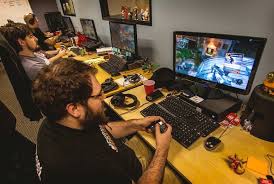Game Tester Jobs, play a crucial role in ensuring that games meet the highest standards of quality and performance. As the gaming industry continues to grow, the demand for skilled game testers has increased, making it an appealing career path for many. This article delves into the responsibilities of game testers, the skills required, the job market, and tips for breaking into this exciting field.
What Does a Game Tester Do?
Game testers, also known as quality assurance (QA) testers, are responsible for evaluating games for bugs, glitches, and overall playability. Their work is essential in delivering a polished product to consumers. Key responsibilities include:
- Bug Identification: Testers rigorously play through games to identify and document bugs, glitches, and other issues. This involves noting how to replicate the problem and providing detailed reports to developers.
- Game Mechanics Evaluation: Testers assess the game’s mechanics, ensuring they function as intended. This includes testing controls, gameplay dynamics, and overall user experience.
- Performance Testing: Evaluating how the game performs under various conditions (such as different hardware setups) is vital. Testers ensure that the game runs smoothly and meets performance standards.
- Feedback and Reporting: Testers provide constructive feedback on gameplay elements, graphics, and user interfaces. They communicate closely with developers to ensure necessary adjustments are made.
- Compliance Testing: Ensuring that games adhere to platform-specific requirements (such as those from consoles or app stores) is also part of the role.
Skills Required for Game Tester Jobs
To succeed as a game tester, candidates should possess a combination of technical and interpersonal skills:
- Attention to Detail: Testers must be meticulous in identifying issues that could affect the player experience.
- Analytical Skills: The ability to analyze gameplay mechanics and identify areas for improvement is crucial.
- Communication Skills: Testers need to effectively communicate findings to developers, often translating complex issues into understandable reports.
- Technical Proficiency: Familiarity with different gaming platforms and an understanding of programming or scripting languages can be advantageous.
- Passion for Gaming: A genuine interest in games and the gaming industry is essential. Testers who are passionate about gaming are more likely to understand player expectations and contribute valuable insights.
The Job Market for Game Testers
The demand for game testers is strong, with opportunities available across various platforms, including console, PC, and mobile games. Many game development studios, ranging from large companies to indie developers, require testers to ensure quality in their products.
While some positions are entry-level, there are opportunities for advancement into senior testing roles, project management, or even game design. The industry also offers freelance opportunities, allowing testers to work on a project basis.
Breaking Into the Field
- Education: While a specific degree isn’t always required, degrees in game design, computer science, or related fields can be beneficial. Many employers value practical experience over formal education.
- Build Experience: Aspiring testers can gain experience by participating in beta testing programs, contributing to gaming forums, or even creating their own games. This hands-on experience can enhance their resumes.
- Networking: Connecting with industry professionals through events, online communities, and social media platforms can open doors to job opportunities.
- Prepare a Strong Resume: Highlight any relevant experience, skills, and passion for gaming. Including examples of testing you’ve done (even if informal) can demonstrate your capabilities.
- Apply to Multiple Opportunities: Be proactive in applying to various companies. Tailor your applications to each position to showcase your fit for their specific needs.
Conclusion
Game tester jobs offer an exciting entry point into the thriving gaming industry. As a vital part of the development process, testers contribute to creating enjoyable and high-quality gaming experiences. With the right skills, experience, and passion for gaming, aspiring testers can carve out a fulfilling career in this ever-evolving field. Whether you dream of playing the latest games or want to be part of creating them, a career as a game tester could be the perfect opportunity for you.




